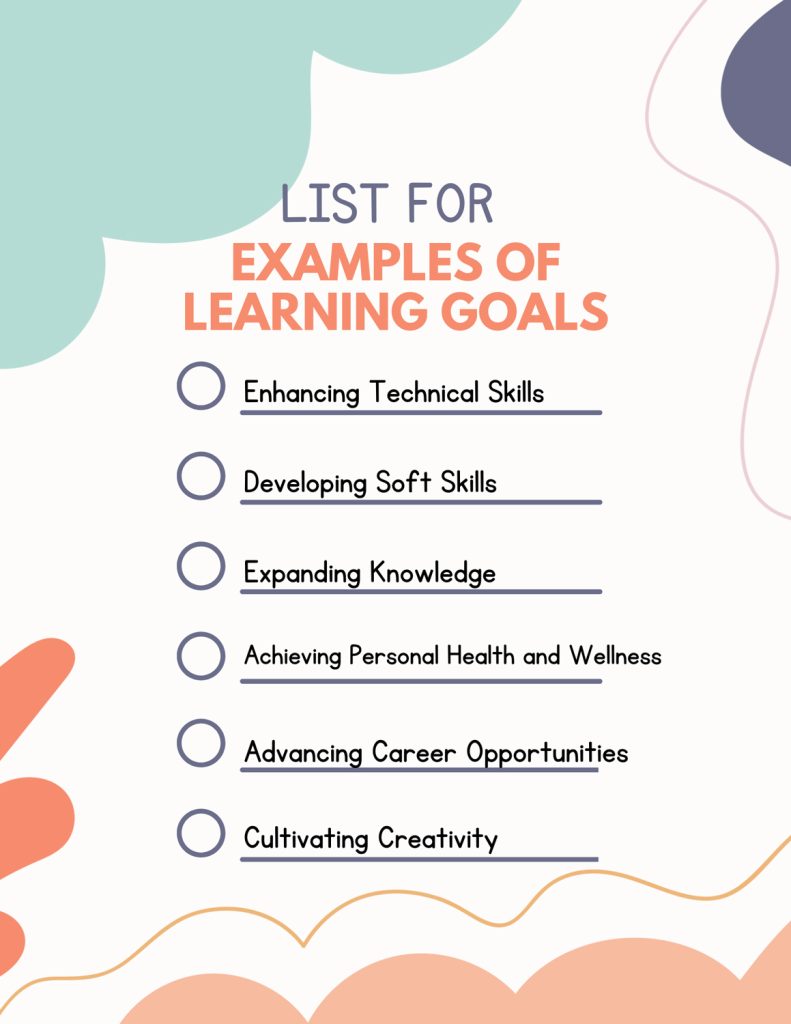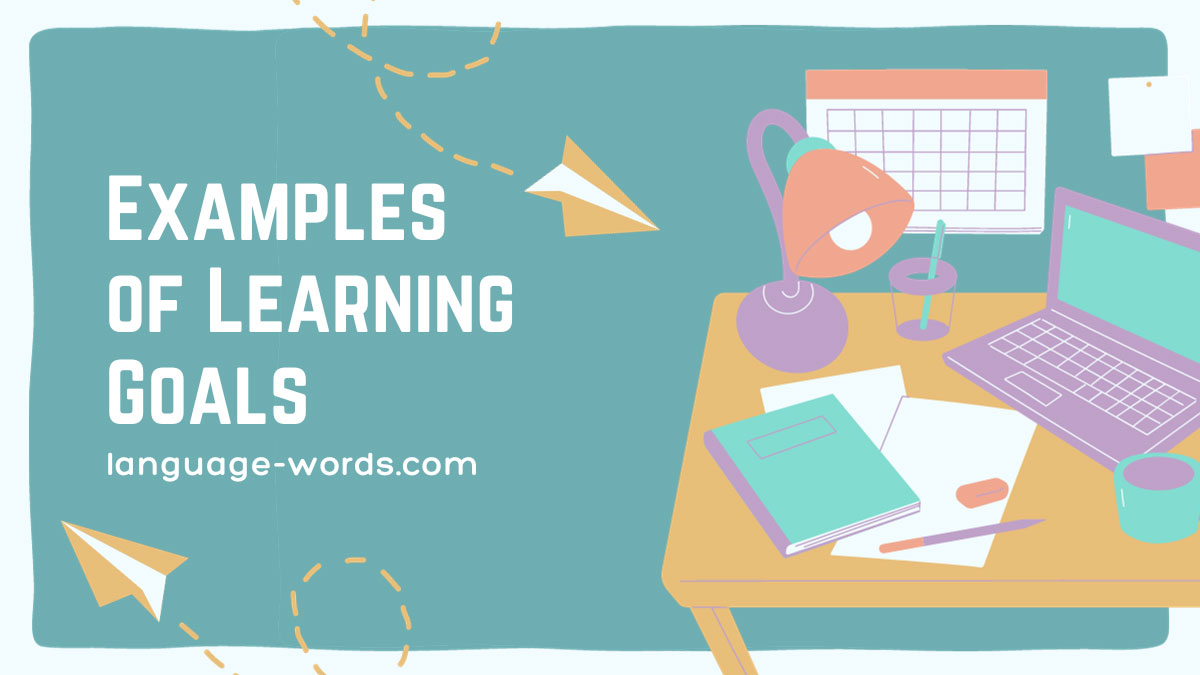When it comes to personal growth and development, setting clear learning goals is essential. Learning goals provide a roadmap for acquiring new skills, expanding knowledge, and achieving success in various areas of life. Whether you’re a student, a professional, or simply someone who values continuous improvement, having well-defined learning goals can help you stay focused, motivated, and on track.
In this article, I’ll share with you some examples of learning goals that can inspire and guide you on your own journey of self-improvement. From enhancing your technical skills to developing soft skills, these examples cover a wide range of areas to help you identify and set meaningful learning goals that align with your aspirations. So, if you’re ready to take your personal growth to the next level, let’s dive in and explore these examples of learning goals that can empower you to reach new heights of success.
Definition List For Examples of learning goals

When it comes to personal growth and development, setting clear learning goals is crucial. Learning goals serve as a roadmap, guiding us towards acquiring new skills, expanding our knowledge, and ultimately, achieving success in various areas of life. To help you better understand the concept, let me provide you with several examples of learning goals:
- Enhancing Technical Skills:
- Developing Soft Skills:
- Expanding Knowledge:
- Achieving Personal Health and Wellness:
- Advancing Career Opportunities:
- Cultivating Creativity:
What are learning goals?

Definition of Learning Goals
Learning goals are targets or objectives that individuals set for themselves to enhance their personal growth and development. These goals are specific, measurable, attainable, relevant, and time-bound (SMART). They serve as a roadmap, guiding individuals towards acquiring new skills, expanding their knowledge, and ultimately achieving success in different areas of life.
Importance of Learning Goals
Setting clear learning goals is crucial for personal growth and development. Here’s why:
- Enhancing Technical Skills: Learning goals help individuals improve their technical skills, whether it’s mastering a programming language, becoming proficient in graphic design, or learning to play a musical instrument. By setting specific goals related to technical skills, individuals can focus their efforts and measure their progress.
- Developing Soft Skills: Soft skills, such as communication, teamwork, and problem-solving, are essential for success in any field. Setting learning goals to improve these skills allows individuals to enhance their effectiveness in the workplace and in interpersonal relationships.
- Expanding Knowledge: Learning goals can be centered around expanding one’s knowledge in a specific area of interest. Whether it’s learning about history, exploring different cultures, or delving into a new scientific field, setting goals to acquire knowledge broadens horizons and opens doors to new opportunities.
- Personal Health and Wellness: Setting goals related to personal health and wellness is crucial for leading a balanced and fulfilling life. Whether it’s committing to regular exercise, adopting a healthy eating habit, or prioritizing self-care, setting learning goals in this area contributes to overall well-being.
- Advancing Career Opportunities: Learning goals can directly impact career growth and advancement. Whether it’s acquiring new certifications, attending professional development workshops, or improving leadership skills, setting goals that align with career aspirations can lead to increased opportunities and success.
- Cultivating Creativity: Setting learning goals related to creative pursuits, such as writing, painting, or photography, allows individuals to tap into their artistic side. By setting specific goals to explore and enhance creativity, individuals can unleash their potential and express themselves in unique and meaningful ways.
By setting clear learning goals in these various areas, individuals can empower themselves in their journey of self-improvement. So, take a moment to reflect on your own learning goals and start working towards making them a reality.
How to set effective learning goals

Assessing your current skills and knowledge
When setting learning goals, it’s essential to assess your current skills and knowledge. Start by asking yourself:
- What are my strengths?
- What are my weaknesses?
- Which areas do I feel confident in?
- Which areas do I need improvement in?
By understanding your starting point, you can better tailor your learning goals to address areas that require growth and development.
Identifying areas for improvement
Once you’ve assessed your skills and knowledge, it’s time to identify specific areas for improvement. Consider the following:
- Are there any skills or knowledge gaps that need to be filled?
- Are there any industry-specific competencies I need to acquire?
- What personal or professional objectives do I want to achieve?
Setting specific and measurable goals
To ensure the effectiveness of your learning goals, they must be specific and measurable. Here’s how:
- Be clear about what you want to achieve. Define your goal in specific terms.
- Make your goal measurable so that progress can be tracked. Set specific targets or milestones to gauge your progress.
- Align your goals with a timeline to give yourself a sense of urgency and establish deadlines for accomplishing them.
Remember, specific and measurable goals provide clarity and focus, giving you a clear path to success.
Creating an action plan
Once you have your goals in place, it’s important to create an action plan. Here’s how to get started:
- Break down your goals into smaller, manageable tasks.
- Prioritize the tasks based on their importance and urgency.
- Assign deadlines to each task to keep yourself on track.
- Monitor your progress regularly and make adjustments as needed.
By creating an action plan, you’ll turn your learning goals into actionable steps, making them more achievable and attainable.
Remember, setting effective learning goals is crucial to your personal growth and development. By assessing your current skills, identifying areas for improvement, setting specific and measurable goals, and creating an action plan, you’ll be well on your way to achieving success.
Examples of learning goals
As the importance of setting effective learning goals becomes more widely recognized, it’s helpful to have some examples to guide you in the process. Below, I’ll provide examples of learning goals across different areas of life to give you a clearer understanding of what these goals can look like.

Professional Development Goals
When it comes to professional development, setting specific and measurable goals can greatly enhance your skills and career opportunities. Here are some examples of professional development goals:
- Improve my leadership skills: By attending leadership workshops and taking on more leadership responsibilities, I aim to develop effective leadership traits and enhance my ability to lead and inspire others.
- Enhance my communication skills: I will take a public speaking course and actively seek opportunities to present in meetings and conferences to improve my communication skills and become more confident in expressing my ideas.
Academic Goals
Whether you’re a student or a lifelong learner, setting academic goals can help you stay focused and motivated in your pursuit of knowledge. Here are a few examples of academic goals:
- Improve my math skills: I’ll dedicate at least 30 minutes each day to practice mathematical concepts and problem-solving techniques, aiming to strengthen my mathematical abilities and understanding.
- Expand my knowledge in a specific field: I’ll read at least two books and attend relevant webinars or workshops in my chosen field of interest to deepen my understanding and stay up-to-date with the latest developments.
Personal Growth Goals
Personal growth goals are centered around self-improvement and overall well-being. Here are a couple of examples of personal growth goals:
- Develop a regular exercise routine: I’ll commit to exercising three times a week for at least 30 minutes, whether through a workout class, jogging, or any physical activity I enjoy, to improve my fitness and overall health.
- Practice mindfulness and meditation: I will set aside 10 minutes each day for mindfulness and meditation exercises, aiming to cultivate a sense of calm and improve my mental clarity.
By setting clear and measurable goals in these areas, you can create a roadmap for personal growth, professional success, and academic achievement. Remember, the key is to define your goals, break them down into small actionable steps, and track your progress along the way.
Stay motivated and focused on your learning goals, and you’ll be amazed at the progress you can make. So go ahead, set your own learning goals and embark on a journey of continuous growth and self-improvement.
How learning goals can benefit you

Motivation and focus
Setting learning goals provides a sense of purpose and direction, which in turn helps to increase motivation and maintain focus. When you have a clear goal in mind, it becomes easier to prioritize tasks and stay on track. By working towards something specific, you are more likely to stay motivated, overcome challenges, and push yourself to achieve success.
Boosting confidence and self-esteem
Having learning goals allows you to challenge yourself and push beyond your comfort zone. As you make progress towards your goals, you’ll start to build confidence in your abilities and develop a strong belief in yourself. Each milestone and achievement will boost your self-esteem and encourage you to take on even bigger challenges. The more you accomplish, the more you’ll believe in your own capabilities.
Tracking progress and celebrating achievements
One of the key benefits of setting learning goals is the ability to track your progress and see how far you’ve come. By defining specific milestones and objectives, you can easily measure your achievements along the way. Tracking your progress not only gives you a sense of accomplishment, but it also helps you identify areas for improvement. When you reach a goal, take the time to celebrate your achievement and recognize your hard work. This celebration will motivate you to continue striving toward even greater success.
Remember, learning goals are not just a means to an end – they are a powerful tool for personal growth and development. By setting clear goals, staying motivated, and celebrating your achievements, you can experience continuous growth and self-improvement. So, take the time to define your learning goals and watch how they transform your life.
Conclusion
Setting learning goals can have a profound impact on personal growth and development. By defining what we want to learn and achieve, we can increase our motivation and focus, boosting our confidence and self-esteem along the way. Learning goals provide a roadmap for progress, allowing us to track our achievements and celebrate our successes.
Remember, learning goals are not just a means to an end; they are a powerful tool for transformation. By setting clear objectives, we can push ourselves to new heights and unlock our full potential. Whether it’s acquiring new skills, expanding our knowledge, or improving our abilities, learning goals provide the structure and direction needed for continuous improvement.
So, take the time to define your learning goals and witness the positive impact they can have on your life. Embrace the journey of growth and watch as you become the best version of yourself. Set your sights high, and with dedication and perseverance, you’ll be amazed at what you can achieve.

